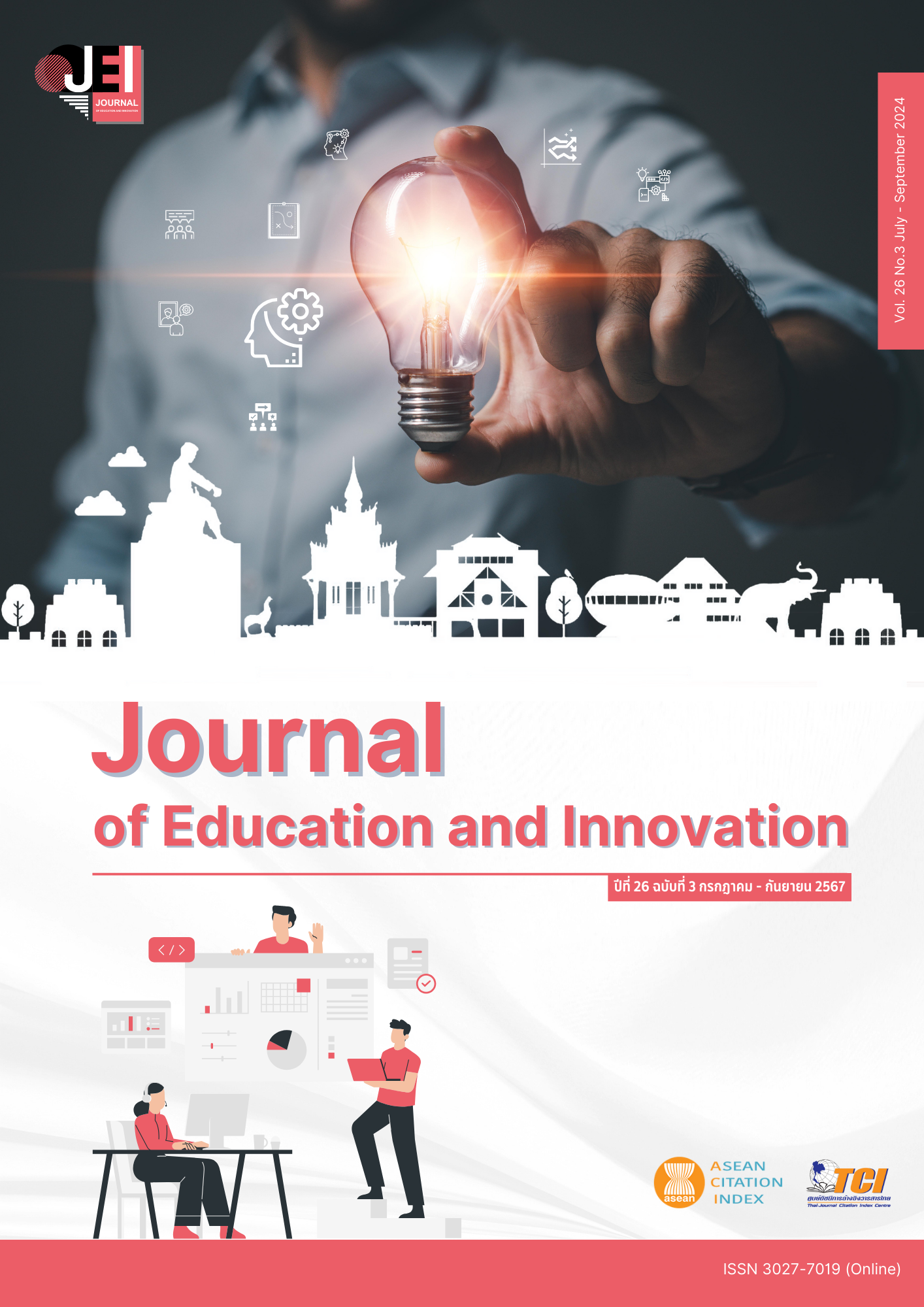THE DEVELOPMENT OF ELECTRONIC PORTFOLIO FOR AUTHENTIC ASSESSMENT ON COMPUTER EDUCATION PROJECT FOR UNDERGRADUATE STUDENTS AT COMPUTER EDUCATION DEPARTMENT, NAKHON PATHOM RAJABHAT UNIVERSITY
Main Article Content
Abstract
The aims of this research study were: 1) to design an electronic portfolio for authentic assessment on Computer Education Project for undergraduate students at Computer Education Department, Nakhon Pathom Rajabhat University, 2) to develop an electronic portfolio, 3) to evaluate the efficiency of the electronic portfolio, and 4) to study student satisfaction regarding the use of the electronic portfolio. The sample group was 108 undergraduate students from the Computer Education Department, Faculty of Science and Technology, Nakhon Pathom Rajabhat University, who enrolled in the Computer Education Project course during the second semester of the 2021 academic year. They were selected using a simple random sampling method. The research instruments included 1) an electronic portfolio, 2) an efficiency evaluation form, and 3) a satisfaction questionnaire. Data were analyzed using mean () and standard deviation (SD). The research findings were as follows: 1) the structure of the electronic portfolio was divided into three parts: 1.1) Introduction: this part showed the basic data of the project. 1.2) Content: this part showed the student tasks that were created at each phase of the project, and 1.3) Assessment: this part showed the criteria and the results of the assessment of the student task. 2) The electronic portfolio was developed in the form of a web application format. The students collected documents and evidence that related to the project. The advisor was able to track the progress, monitor, give some suggestions, and assess the student task using an authentic assessment process. 3) Overall, the experts agreed that the electronic portfolio displayed a very high level (
= 4.92, SD = 0.27) of efficiency, and 4) the students were satisfied at a very high level (
= 4.81, SD = 0.41) with regard to the use of the electronic portfolio.
Article Details

This work is licensed under a Creative Commons Attribution-NonCommercial-NoDerivatives 4.0 International License.
The owner of the article does not copy or violate any of its copyright. If any copyright infringement occurs or prosecution, in any case, the Editorial Board is not involved in all the rights to the owner of the article to be performed.
References
Ampun, K., & Pasiphol, S. (2021). The effect of using electronic portfolios together with activities according to the stem educational approach on science process skill development of elementary school students. Journal of Educational Measurement, 38(104), 118-131.
Barrett, H. (2001). Introduction to the Electronic Portfolio. Retrieved August 12, 2022, from https://electronicportfolios.org/handbook/IntroEPortfolio.pdf
Dechphongsumrit, A., Visitsakwasin, S., & Lertchaiprasert, P. (2017). The prototype of electronics portfolio (E-Portfolio) application on mobile phone. International Journal of Applied Computer Technology and Information Systems, 7(2), 40-46.
Iamsiriwong, O. (2012). System analysis and design. Bangkok: SE-EDUCATION Public Company Limited.
Kittisup, K. (2004). Authentic Assessment. Royal Thai Naval Academy Journal, 4(4), 8-18.
Koraneekid, P. (2007). Development of electronic portfolio model using self-assessment to enhance student teachers' critical thinking. Bangkok: Doctor of Philosophy Program in Educational Communications and Technology, Faculty of Education, Chulalongkorn University.
Lueng-anggoon, N. (1998). The portfolio development plannning according to the authentic assessment. Journal of Educational Measurement Mahasarakham University, 4(1), 1-9.
Nasritha, K., Angskun, J., & Angskun, T. (2022). The development of an assessment system for affective domain behavior in online learning. Journal of education Naresuan University, 24(4), 84-97.
Office of the Education Council. (2017). The National education plan B.E. 2560-2579. Bangkok: Prikwarn Graphic.
Paenkaew, J., Sungkachat, B., Damsangsawas, N., & Namjaroen, T. (2019). Authentic Assessment. Journal of Education Burapha University, 30(1), 22-33.
Pasiphol, S., & Sotthayakom, P. (2016). Development of electronic portfolio model to assess learning development of elementary school student. Kasetsart Journal of Social Sciences, 37, 291-305.
Permsup, V. (2018). Introduction to computer and information technology. Bangkok: Provision Company Limited.
Pothisan, P. (2006). Portfolio. Retrieved March 30, 2023, from http://ejournals.swu.ac.th/index.php/ENEDU/article/viewFile/5753/5391
Putkaew, P. (2009). The implementation of authentic assessment. Pasaa Paritat Journal, 24, 55-71.
Satzinger, J. W., Jackson, R. B., & Burd, S. D. (2008). Systems Analysis and Design in a Changing World (5 ed.). Boston, Massachusetts, USA: Course Technology.
Siphai, S., & Sinlarat, P. (2018). Thailand's Educational Transformation towards Education 4.0. Journal of Educational Measurement, Mahasarakham University, 24(2), 13-27.
Tiamboonprasert, C. (1998). Portfolio Assessment. Journal of Educational Measurement, 20(59), 61-82.
Uttamasiriseni, C. (2019). The development of web application online for skill of undergraduate students. APHEIT Journals, 8(2), 75-90.
Wiggins, G., & McTighe, J. (2005). Understanding by design (2nd ed.). Alexandria VA: Association for Supervision and Curriculum Development.


